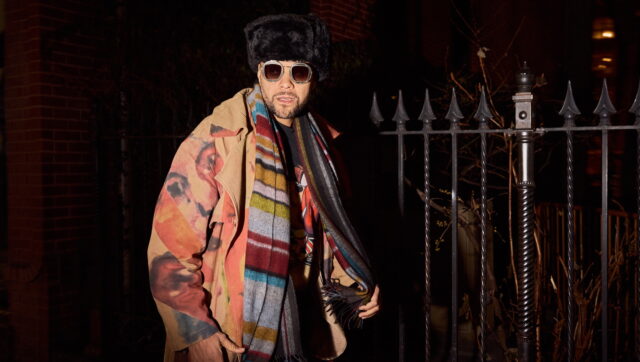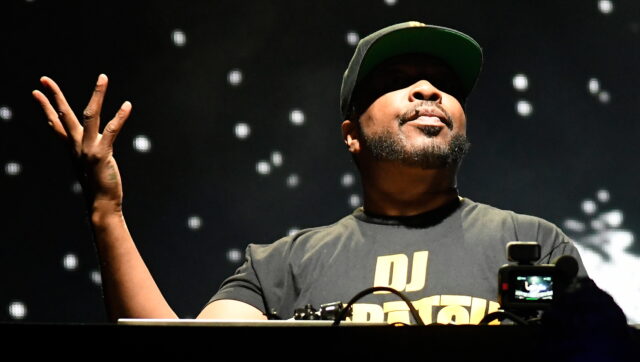‘Wu-Tang Forever’ … Forever
Twenty-five years ago, the shiny-suit era ruled hip-hop. But the Wu-Tang Clan stood up for hardcore rap with a marathon double album that became their biggest seller.
by Alvin aqua Blanco
Credit: Bob Berg/Getty Images.
At the time the Wu-Tang Clan’s sophomore double album, Wu-Tang Forever, was released, hip-hop was getting drunk off Cristal. And while Wu-Tang were no longer throwing darts in piss-filled stairwells in ’97, they were in a much more comfortable position. After all, their debut LP, Enter the Wu-Tang (36 Chambers), had already entered the hip-hop canon, along with an obscenely creative run of solo albums including Method Man’s Tical, Ol’ Dirty Bastard’s Return to the 36 Chambers: The Dirty Version, Raekwon’s Only Built 4 Cuban Linx…, GZA’s Liquid Swords and Ghostface Killah’s Ironman. All were consensus classics, and all were mostly helmed by the sonic metallurgist known as the RZA.
When the purple smoke of these masterpieces cleared, the Wu-Tang Clan had gone from being that Staten Island group the entire city could rally behind to an internationally recognized conglomerate. For the follow-up to Enter the Wu-Tang, the WTC once again formed like Voltron, with further refined skills and bigger egos, and some of their best work made it onto Forever’s 27 (!) tracks.
A handful of members managed to augment their solo successes. Wu’s EPMD of Ghost & Rae continued to tagteam multiple tracks, as on “The M.G.M.” and “Older Gods” (with GZA adding a searingly precise and succinct closing verse on the latter). Ghostface delivered a preview of his non-sequitur rhymes that simply sound great on “Bells of War,” while his storytelling is stellar on “Impossible,” which also features Rae expounding on the forever-contemporary need for gun control. Meanwhile, every verse in Inspectah Deck’s clip of rhymes built anticipation for his ultimately delayed debut solo album, particularly his lead-off bars on “Triumph” — I bomb atomically, Socrates’ philosophies and hypotheses — an opening salvo considered one of rap’s best.
Unfortunately, that bold first single demonstrated Ol’ Dirty Bastard’s relegation to only the occasional cameo throughout Forever — a circumstance due not to diminishing talent but to legal troubles that would keep him from contributing in full. But even a part-time Dirt McGirt still holds a commanding presence on “Maria” and on “Dog Shit,” whose misogyny has prevented it from aging well. An always-sharp Method Man, a stepped-up Cappadonna and even a too-often-overlooked Masta Killa and U-God all understood their assignment: Come with your best and nothing less.
The double-album length had much to do with the challenge of distilling the RZA’s overpacked vault down to a mere dozen or so tracks — which the Abbot was able to masterfully do on the debut. Instead, for the sophomore set you had rappers fiercely battling for their piece of real estate, which led to the lazy criticism that Forever was too much to handle at one time. To be fair, an album clocking in at just under two hours was a big ask in 1997, long before our Deluxe Edition streaming era. And the content here is dense: lessons from the Nation of Gods and Earths — the album’s opening track, “Wu-Revolution,” is essentially a sermon from the late Popa Wu — woven into street tales, fiery socio-political commentary and warnings to all their imitators.
But what has been taken for granted over the past quarter-century — along with Forever’s forgotten critical and commercial success; it’s the WTC’s best-selling album — is the amount of gems the Wu were able to create. Even cuts that never saw the light of a single or b-side release have only appreciated with time, among them “Hellz Wind Staff” and “Bells of War,” both regularly cited favorites among devoted fans. On the latter, RZA says in its postscript, “Yo Shorty, you don’t even gotta go to summer school/Pick up the Wu-Tang double CD,” hitting on a recurrent theme of wise elder statesmen showing the way.
Wu-Tang Forever was meant to be a deep dive, a musical lecture. At the outset Popa Wu expounds on the importance of preparing for the future and leading the children into a better tomorrow. Speaking of which: “A Better Tomorrow,” which serves as the philosophical centerpiece of the album, despite being in the penultimate spot on the first disc, one before the second single, “It’s Yourz.” Wu-Tang’s last proper group effort, released in 2014, shares the song’s title and its sentiments, which are ongoing. “We have to all respect each other in order for us to make things better. All of the different injustices happening in the world today are outdated,” RZA told Life+Times that year. “Are we men or are we beast? Nothing changes overnight, but hopefully we can inspire the questions and inspire the ideas [that will bring] a better tomorrow. And even if you’re doing good, you can use a better tomorrow. It says it in the good book: ‘Give us this day our daily bread.’ So yeah, we’ll take our daily bread, but we’re still striving for that kingdom every day.”
Although RZA was still leading the charge, he did enlist production help from 4th Disciple (“Cash Still Rules/Scary Hours”) and True Master (“The M.G.M.”). Due in part to RZA’s growing disdain for producers biting his style, fewer samples were used. The soundscape was still Wu, but with more of RZA’s homegrown orchestration, and the difference was noted by fans and critics. “Not since Isaac Hayes … has any black pop artist used strings in a sexier or spookier manner,” wrote the renowned late critic Greg Tate in his review of the album for the Village Voice.
What must also be considered, and appreciated, is the RZA and his producers’ refusal to cater to the shortsighted demands — read: records to dance to — of commercial hip-hop. Remember that Bad Boy and their imitators ruled the charts in 1997. Wu-Tang Forever broke new hip-hop ground by reaching No. 1 in the U.S. and U.K., went Gold in its first week and was certified four-times Platinum that fall: an outsize accomplishment, no doubt, but the CD era was still in rapid ascent in ’97. The Notorious B.I.G.’s Life After Death would go 11-times Platinum; Sean Combs’ solo debut as Puff Daddy, No Way Out, which beat out Forever for the Best Rap Album Grammy, would hit seven-times Platinum. Even Will Smith’s Big Willie Style would rack up a smooth nine million copies and counting. The WTC left money on the table to remain steadfast in their principles, and in time they’ve been rewarded for it.
Hip-hop’s daily hustle and bustle is full of new rappers throwing everything at the wall, hoping against hope that their music will somehow stick. Few, let alone a group consisting of 10 core members, will ever see a fraction of the longevity demonstrated by the Wu-Tang Clan. They will forever stand for hip-hop in its purest form.
To celebrate the 25th anniversary of Wu-Tang Forever, TIDAL has launched a comprehensive Artist Experience page featuring playlist and album curation.
In addition, a special series of digital-EP reissues — Triumph, It’s Yourz and Reunited: The Remixes, is available on the platform. Limited-edition physical reissues, including vinyl and cassette versions of the album and a seven-inch single, can be pre-ordered.



